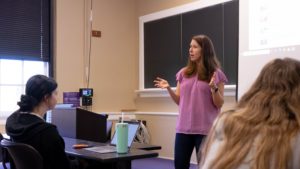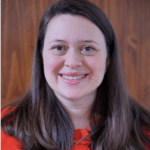07 Nov2022
From the Holmes Bulletin
By Gaurav Harshe
This reflection originally appeared on the Holmes Scholars Bulletin.

Who would take me under their wing? Why would they help me get into a doctoral program? Does anyone see me and any potential in me?
Questions of uncertainty, depreciation, and self-doubt were hurling at me as I searched for a doctoral program in Higher Education and Student Affairs Administration.
Yet, as I navigate the University of South Carolina’s program for these past two months of the semester, I have found that I belong, with all my humanity being present in the spaces I navigate.
04 Nov2022
By Michael Staton
 This article was originally published by Clemson News and is reprinted with permission.
This article was originally published by Clemson News and is reprinted with permission.
Catherine Griffith serves as a clinical associate professor of special education in the Department of Education and Human Development at Clemson University. She coordinates the Master of Education program in Special Education with emphases in academic and behavioral interventions and teaches coursework on individuals with learning disabilities and emotional and behavioral disorders, intensive academic interventions, and applied behavior analysis.
02 Nov2022
By AACTE

The annual election for the AACTE Board of Directors is now open and runs through November 30. This year, there are six individuals running for two at-large seats and one seat representing AILACTE.
01 Nov2022
By Brandi Palmer

AACTE is launching “75 Days/75 Ways,” a nationwide campaign to raise awareness of ways to support changes that ensure every student has a highly trained and qualified teacher in their classroom and equitable education is available for all learners.
01 Nov2022
By AACTE

AACTE invites you to elevate educator preparation. Does your institution have a best practice that deserves national attention? Do you want to recognize the achievements of a colleague in the field?
There is still time to submit an entry for the 2023 AACTE Awards. The deadline has been extended to Monday, November 7.
31 Oct2022
By Brandi Palmer
AACTE thought leaders have spoken about issues ranging from solutions to the teacher shortage to the impact of censorship on education over the past month.
As a result, AACTE has been cited in stories about colleges innovating ways to fill teacher jobs, reinvigorating interest among students in the teaching profession, and celebrating the next generation of teachers.
31 Oct2022
By Kaitlyn Brennan
The new “In the States” feature by Kaitlyn Brennan is a weekly update to keep members informed on state-level activities impacting the education and educator preparation community.
States and districts around the country continue to scramble to fill teaching positions with fully certified, profession ready educators. A recent analysis from the Southern Regional Education Board of 2019-20 data in 11 states found roughly 4% of teachers — which could be up to 56,000 educators — were uncertified or teaching with an emergency certification. By 2030, the number of uncertified teachers or those teaching with an emergency certification is expected to balloon. The Southern Regional Education Boards projects that upwards of 16 million K-12 students in the Southern region of the country could be taught by an unprepared or inexperienced teacher. While the pandemic certainly exacerbated the problem, it is not new and has steadily gotten worse over the last decade. For example, in Texas school districts’ reliance on uncertified new hires increased significantly over the last decade. In the 2011-12 school year, fewer than 7% of the state’s new teachers — roughly 1,600 — didn’t have a certification. By last year, about 8,400 of the state’s nearly 43,000 new hires were uncertified.
31 Oct2022
By Michael Rose
The Department of Education recently announced permanent changes to the Public Service Loan Forgiveness program to make it easier for borrowers to see their federal student loans forgiven under the program. Many of these changes were announced earlier this year on a temporary basis; they will take effect in July 2023.
31 Oct2022
By University of San Diego Media Relations Office
 The School of Leadership and Education Sciences (SOLES) at the University of San Diego has received a $1.5 million grant from the San Diego Foundation to develop and launch the Black InGenius Initiative (BiGI)– a college access and early literacy program for Black students within the San Diego region.
The School of Leadership and Education Sciences (SOLES) at the University of San Diego has received a $1.5 million grant from the San Diego Foundation to develop and launch the Black InGenius Initiative (BiGI)– a college access and early literacy program for Black students within the San Diego region.
Sixty rising sixth graders will be selected for BiGI every year starting in fall 2023. USD will provide students with consistent academic support delivered by SOLES students and faculty trained in neurodivergent teaching, which is the idea that people experience and interact with the world around them in different ways, therefore there is no one “right” way of thinking, learning or behaving.
28 Oct2022
By Elizabeth Bradley
 Virtual reality has a number of applications for pedagogy and teacher training; simulation training in these much-needed areas may add an essential component to the field of teacher education (Tondeur, Pareja-Roblin, van Braak, Voogt, & Prestridge, 2017). Computer simulations can provide guided practice for a variety of situations that pre-service teachers wouldn’t frequently experience during their teacher education studies (Mason, Jeon, Blair, & Glomb, 2011; Mason, 2011). Simulations can help pre-service teachers develop the skills that it takes to properly run a classroom without the high-stakes risk of causing harm to actual students (Matsuda, 2005).
Virtual reality has a number of applications for pedagogy and teacher training; simulation training in these much-needed areas may add an essential component to the field of teacher education (Tondeur, Pareja-Roblin, van Braak, Voogt, & Prestridge, 2017). Computer simulations can provide guided practice for a variety of situations that pre-service teachers wouldn’t frequently experience during their teacher education studies (Mason, Jeon, Blair, & Glomb, 2011; Mason, 2011). Simulations can help pre-service teachers develop the skills that it takes to properly run a classroom without the high-stakes risk of causing harm to actual students (Matsuda, 2005).
There are numerous benefits to game-based learning, including improved learner motivation and engagement, constructive knowledge frameworks, exploratory and independent learning and, at times, higher achievement outcomes over traditional pedagogy (Boyle et al., 2016; Cheong, Flippou, & France, 2015; Peterson, 2019). Simulations can allow pre-service teachers to see their students from a different perspective, gain insight into the best ways to manage their future classroom, and understand the direct consequences of their actions in the classroom (Ferry et al., 2004). Including simulations in pre-service teaching coursework has demonstrated an increase in the confidence and effectiveness of first year teachers (Englebert, 2010).
28 Oct2022
By Leslie Ekpe

Congratulations to Phylicia Anderson, on being named Holmes Scholar of the Month! Anderson is a doctoral candidate at Texas Woman’s University.
Her latest publications include a chapter in the book, Engage and Empower: Expanding the Curriculum for Justice and Activism, titled “Cultural (mis)representations in the media: Challenging hegemonic ideas,” as well as a journal article published in the Journal of Language and Literacy Education, titled “Language, literacy, and love: A critical framework for teaching adolescent emergent bilinguals.”
28 Oct2022
By Weade James
We are excited to welcome four outstanding scholars to the Holmes Community. Please join us in welcoming Jordana Simmons (Rowan University), Zhan Shi (Texas Christian University), Denise Mugabe (Texas Christian University), and Monica Manzur (Texas Christian University).
25 Oct2022
By Katrina Norfleet

Does your institution have a best practice that deserves national attention? Do you want to recognize the achievements of a colleague in the field? You still have time to nominate institutions and individuals for a 2023 AACTE Award. The deadline to apply is October 31, 2022.
Help AACTE To identify notable programs, practices, activities, writing, and research that strengthen the profession of teacher preparation through innovation, high standards, and leadership. Winning entries will be recognized formally at the 2023 Annual Meeting, February 24-26, in Indianapolis, IN.
Learn more about the 2023 AACTE Awards, eligibility, and criteria. AACTE invites nominations or applications for the following awards:
25 Oct2022
By AACTE
AACTE today released a newly commissioned report on The State of Education Censorship in Institutions of Higher Ed and Implications for the Field. The report, authored by AACTE member Ashley L. White, Ph.D., is a comprehensive overview of proposed and enacted censorship in education impacting educators, students, and preparation for the next generation of teachers.
25 Oct2022
By Jessica Jackson
Understanding learner variability helps disrupt the idea of a one-size-fits all approach and paves the way for more equitable teaching and learning. The intersection of culturally responsive practice with the science of learner variability can provide great insight into what it takes to successfully implement culturally responsive instruction with both teachers and students. It also helps us understand why culturally responsive practices are necessary for reaching and embracing the whole learner.
On November 10, 2022 at 1:00 p.m., we will hear from our distinguished panelists, Courtney Teague, Angela Elkordy, and Leigh Ann Erikson, on how they approach culturally responsive practice in their courses and practice. We’ll discuss some of the key findings from the research on culturally responsive practices, where the research gaps are, and the importance of culturally responsive practices in teacher education and K-12 classrooms. Register today for the Learner Variability and Culturally Responsive Practices, hosted by Digital Promise and AACTE.
 Who would take me under their wing? Why would they help me get into a doctoral program? Does anyone see me and any potential in me?
Who would take me under their wing? Why would they help me get into a doctoral program? Does anyone see me and any potential in me?






 This article was originally published by
This article was originally published by 


 The
The  Virtual reality has a number of applications for pedagogy and teacher training; simulation training in these much-needed areas may add an essential component to the field of teacher education (Tondeur, Pareja-Roblin, van Braak, Voogt, & Prestridge, 2017). Computer simulations can provide guided practice for a variety of situations that pre-service teachers wouldn’t frequently experience during their teacher education studies (Mason, Jeon, Blair, & Glomb, 2011; Mason, 2011). Simulations can help pre-service teachers develop the skills that it takes to properly run a classroom without the high-stakes risk of causing harm to actual students (Matsuda, 2005).
Virtual reality has a number of applications for pedagogy and teacher training; simulation training in these much-needed areas may add an essential component to the field of teacher education (Tondeur, Pareja-Roblin, van Braak, Voogt, & Prestridge, 2017). Computer simulations can provide guided practice for a variety of situations that pre-service teachers wouldn’t frequently experience during their teacher education studies (Mason, Jeon, Blair, & Glomb, 2011; Mason, 2011). Simulations can help pre-service teachers develop the skills that it takes to properly run a classroom without the high-stakes risk of causing harm to actual students (Matsuda, 2005). Congratulations to Phylicia Anderson, on being named Holmes Scholar of the Month! Anderson is a doctoral candidate at Texas Woman’s University.
Congratulations to Phylicia Anderson, on being named Holmes Scholar of the Month! Anderson is a doctoral candidate at Texas Woman’s University.